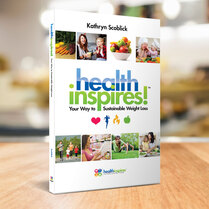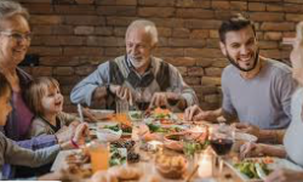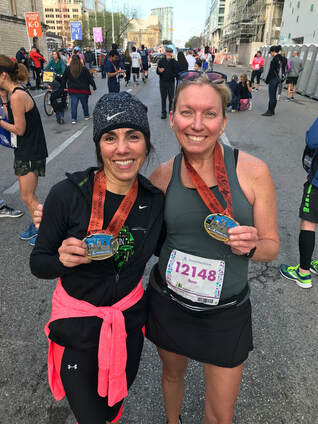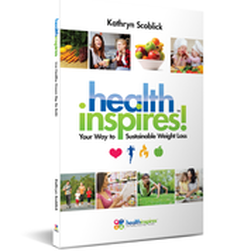 (Excerpt from Health Inspires: Your Way to Sustainable weight Loss, 2017) Positive psychology holds that there are practices that can increase the long-term positive feelings of happiness. We may all have fleeting moments of happiness, but these practices aim to raise our baseline of happiness to a higher level. These daily disciplines—including expressing gratitude, practicing meditation and breathing techniques and reciting mantras—are scientifically proven to promote a positive mood, relieve stress, enhance cognitive functioning and promote healthy behaviors. Such disciplines don’t come in a pill, a bottle or from a doctor’s office. They come from you, are executed by you and are done for you. They give you a choice in the present moment that helps you in each future moment. The same positive results can come from exercise, yet these consistent daily disciplines I am speaking of come from the mind. Expressing Gratitude Gratitude is an emotion expressing appreciation for what you have instead of focusing on what you want or what you don’t have. Gratitude is getting a lot of attention these days, and that is good. It is a simple and free solution to many “problems.” It is not a new concept at all, and in fact, it has withstood the test of time. Practicing the daily discipline of gratitude is the perfect way to focus on all that is working in your life. The practice of gratitude is more powerful and meaningful than “positive thinking.” Positive thinking alone does not create change. Just because you tell yourself you can make it to the next gas station on an empty tank doesn’t mean that you will. Expressing gratitude promotes feelings that make you more likely to create, achieve, succeed, live in happiness and feel joyful. Expressing daily gratitude rewires your brain, promotes positive feelings and emotions, inspires and helps you see the opportunities before you. It proves to deliver long-lasting positive feelings and enhances emotional and interpersonal wellbeing. (38) It is a virtue to nurture. Researchers Ken Sheldon and Sonja Lyubomirsky examined the motivational predictors and positive emotional outcomes of regularly practicing two mental exercises in a study published in The Journal of Positive Psychology in 2006. They looked at how expressing gratitude or “visualizing best possible selves” (VBS) might increase and sustain positive emotion over time, as opposed to fleeting moments of happiness. VBS is simply picturing yourself and focusing on that image of your very best self, how you look, how you feel, doing whatever you envision for your life, as if it were already happening. For this study, subjects were divided into three groups: one that practiced the discipline of gratitude every day, one that participated in a VBS exercise every day, and a control group that simply rehashed the events of their day (poor control group)! What the researchers found was not surprising. The VBS and daily gratitude groups were much happier than those subjects who focused on daily task recitation. The VBS group actually faired a little better than the gratitude group, although the difference was not statistically significant. The reason I share this with you, even as we talk about the benefits of practicing gratitude, is to point out that, as individuals, we may have different preferences for approaching positive affect (how we subjectively experience positive emotions) in our lives. The researchers recognized that there may have been some people sorted into either the VBS or the gratitude group who would have felt better in the opposite group. Perhaps an individual’s preferences, temperament, beliefs, personality and motivation would have been better matched to the other group. Both methods proved to enhance mood far beyond a recall of daily events. (39) However, each of us needs to discover what works for us personally. Increases in feeling good about life are the highest when the method to boost appreciation fits your interests and values and when it is performed neither too frequently nor too seldom. (40) To increase and sustain positive emotions, we must engage in appropriate strategies and practices that we perform with effort and habitual commitment. (41) This is consistent with the finding that the pursuit of personal goals boosts wellbeing only if the goals are actually achieved. Achievement is important. In addition to the positive mental boost, gratitude impacts our physical health, as well. According to Robert A. Emmons, professor of psychology at UC Davis and a leading expert on the science of gratitude, the practice of gratitude can have dramatic and lasting effects in a person’s life. Studies show that a practice of gratitude can:
All of these factors lead to a happier, more fulfilling life. In her keynote address to the American Heart Association’s (AHA) 2014 Austin “Go Red for Women” event (“Go Red for Women” is the AHA’s fundraising campaign for women’s cardiovascular disease awareness and prevention), Kristin Armstrong said that she practices gratitude every day and takes it one step further. She adds WHY she is grateful. She said in a full year of this practice, “I have not had one bad day.” I promise you, you will not have one bad day, because that is what gratitude does. It makes you the person that Maslow said we could be. You face and handle your problems that are within your control, check them off your list and focus on all the good things in your life. Journal Exercise: 1. Write down 10 things that you are grateful for (and if that number deters you--then start with ONE thing that you are grateful for). Then, each day, write at least three things that you are grateful for and why you are grateful for them. Make this a consistent daily discipline. Saying the two words “Thank you” is powerful. We all like to feel appreciated, and those who appreciate are appreciated in return. You just might find that being grateful will help you see opportunities that you may not have seen before. (38-41) Sheldon, Kennon M., Lyubmirsky, Sonja. How to Increase and Sustain Positive Emotion: The Effects of Expressing Gratitude and Visualizing Best Possible Selves. The Journal of Positive Psychology, April 2006; 1 (2): 73-82. (42) Emmons, Robert. Greater Good. Why Gratitude is Good. November 16, 2010. Retrieved from http://greatergood.berkeley.edu/article/item/why_gratitude_is_good. March 1, 2016. Kathryn Scoblick Copyright Health Inspires
0 Comments
 My thoughts and prayers are with all of us dealing with COVID-19, from those directly affected with illness, for concern of loved ones and sorrow for those lost, and for lives affected by the economy and the uncertainty that comes with it. After I finally came to grips with the magnitude of the coronavirus, my default perspective kicked in. That is, all roads lead to health from my view. Health affects everything, and is determined mostly by how we eat, how we move our bodies, how we think and how we feel. And, in this case, how susceptible we are to coronavirus. What we can and cannot control Age The number one risk factor for coronavirus is age. Age is the one risk factor we cannot control. It is what it is. It’s life. But we can control how healthily we age, which is factored in to the age related risk of coronavirus. The other three coronavirus risk factors are heart disease, diabetes and lung disease. These three are mostly preventable, within our control, and affect how we age, compromise our immune systems, and make us more vulnerable to illness. But it doesn’t have to be this way. Heart Disease
Lung Disease Lung disease includes things such as COPD and asthma. Asthma is essentially bad luck—with a tendency to develop it through heredity, but it doesn’t mean it has to—and environmental factors including overweight. On the other hand, COPD is not essentially from bad luck, or heredity. The number one cause of COPD is SMOKING. About 15% of our population still smokes today. Smoking is the number cause of preventable death today. Smoking is within our control. Heart disease and diabetes have a direct correlation with obesity, and obesity is preventable. All roads lead to health. Forty two percent of American adults aged 20 and over are obese (2017-2018). Estimates say it will continue to rise. We live in an obesogenic society—meaning—the sum of influences that the surroundings, opportunities, or conditions of life have on promoting obesity in individuals or populations. That means our food environment is much of the problem. Overweight and obesity were associated with nearly 1 in 5 deaths (18.2%) among adults in the United States from 1986 through 2006, according to a study published in the American Journal of Public Health. And straight from the CDC website, “Obesity is a serious concern because it is associated with poorer mental health outcomes, reduced quality of life, and the leading causes of death in the U.S. and worldwide, including diabetes, heart disease, stroke, and some types of cancer.”1 And, most important to note, “People and families may make decisions based on their environment or community.”2 Many people try to make positive health change, but one of the major the obstacles is the food environment and culture. We must change our culture to make it easier for people to make healthier choices. As a nation, we are unfit for our military, we have lost productivity at work to the tune of $8 billion per year, and the strain on our healthcare system with obesity related healthcare costs at a staggering $190.2 billion per year – that’s 21% of annual medical spending in the United States! And childhood obesity breaks my heart. It's an awful trend. It is responsible for $14 billion in direct medical costs and will continue to rise.3 Our government is handling the coronavirus crisis beautifully. They have all hands on deck, doing what they can, as fast as they can. The federal and local task forces are putting in the work and saving lives. I am grateful. This crisis is incredibly devastating. This is a great use of our government resources. When it comes to the obesity crisis that kills nearly 20% of Americans each year, I have a few suggestions necessary for top down change, while communities take on the necessary grassroots efforts. There are many things that need to happen to shift our culture and make it easier for Americans to choose healthier diets and to exercise. For starters:
Food Policy Our government will need to decide that the health of our nation is more important than politics, i.e., vs. the food/sugar/beverage lobbies. There is clear reluctance to take on the food lobbies and the sugar and sweetened beverage lobbies, etc. for our nation’s health for obvious political reasons. Obesity has risen in the past four decades as we see continued marketing increase to both children and adults. I investigated the FDA marketing report years ago and wrote about it in my book Health Inspires. I was not impressed with the changes made from those efforts with our tax dollars. At least there is much less marketing in our nation’s schools. I am not for a processed food tax based on what I know about our government’s work in this space. They have showed us they side with the lobbies by their inaction for policy change. That is my opinion. Their work in this space is unremarkable from my view. My inner child says they don’t deserve my tax dollars for this cause. This would raise the price of junk food, which I am for, and I think there is a better way to do this. I am for making healthy foods less expensive and junk foods more expensive. I am also for creating a large octagonal warning sign for front of package on over processed food products loaded with chemicals, sodium, sugar, unhealthy fats and other additives. The image has an educational message that will influence people’s purchasing habits for their families and the higher price will make it a no brainer not to buy it. The presumption is that the manufacturers will make healthier foods since we are now not buying their products with higher prices and warning labels. And the healthier foods will cost less ( I know…I am really dreaming now). Our buying power creates change in the food industry. Dr. Barry Popkin has spent his life’s work in this space. Look him up and listen to my interview with him on the Holistic Health and Happiness podcast Episode 2. Dr. Popkin explains how his work in other countries have changed people’s food purchasing habits. You can make your own decisions on food tax, regulations and warning signs. Education It must align with policy change. I pitched a Modern Day Home Economics class to SXSW EDU in 2016 for the 2017 event to include food marketing awareness so children can learn from an early age about food marketing. You can view it here. It’s under three minutes. It didn’t make the cut. This class was to include cooking skills among other life skills. Bring it back! There is a lot of great work being done in our public health departments/schools. We need to start earlier in young lives. I suggest some tax dollars be spent on billboard ads in at risk areas, sharing positive public health messages and resources available to society. We need to take care of the food desserts, etc. There are soooooo many things we can change to educate people on healthy food choices. Support Support comes from families and communities. There are resources available to help these grass roots efforts create health change in our society. Listen to my interview with Dr. Baker Harrell on the Holistic Health and Happiness podcast, Episode 1. Dr. Harrell founded It’s Time Texas to create a health movement in Texas. Baker’s story might inspire many to make positive health change. We can do this together. We are always stronger together. Stopping this coronavirus pandemic is a priority. I praise our government’s work here. When things settle, we need urgency to shift the obesity epidemic. It’s a real problem and together, we can turn the tide. It’s time. copyright Kathryn Scoblick Health Inspires, LLC Live Healthy. Dream Big. Be Bold. Healthinspires.com Bio: Kathryn Scoblick is author of Health Inspires: Your Way to Sustainable Weight Loss and creator of the Holistic Health and Happiness podcast found on Apple Podcasts and Spotify and on her website healthinspires.com/podcast. She serves on the Austin Mayor’s Health and Fitness Advisory Council, is a Health Education expert on Sharecare (owned in part by Dr. Oz and Oprah Winfrey) and contributes to her local school districts School Health Advisory Council (SHAC). She is proud to work for Honor, helping more people age safely at home as they age. Footnotes: 1,2. https://www.cdc.gov/obesity/adult/causes.html 3. https://www.healthycommunitieshealthyfuture.org/learn-the-facts/economic-costs-of-obesity/  On October 16, 2016, I e-mailed Dr. Elizabeth Loftus an endorsement request for my book Health Inspires: Your Way to Sustainable Weight Loss and she responded soon after with these magical words… "Book sounds fascinating... happy to have it and see if I can help..." I learned about her only three hours earlier when I whimsically chose her TED Talk for my Sunday jog listening enjoyment. Loftus mentions childhood obesity in the last several minutes of her TED Talk, along with Santa Claus (makes perfect sense when you listen), and my adrenaline shot through the roof! I couldn’t run home fast enough to Google Elizabeth Loftus, PhD. I have learned since then, that many people know exactly who she is. Dr. Elizabeth Loftus is the top ranked woman psychologist on the top 100 most eminent psychologists of the 20th century list that includes Freud and Maslow. She is recognized for her research and expertise in false memories. She has been instrumental in cases such as OJ Simpson and Oliver North and in litigations involving Michael Jackson and Martha Stewart…and that barely scratches the surface. Her 44-page CV gives a glimpse of her life’s work, which includes her research on how false memory may influence food choices. Even after learning all of that, I still found the courage to ask for her endorsement. I sent her my book, and a few weeks later I had the most exhilarating endorsement! Why would I seek a psychologist’s endorsement? For many of us, eating is what we do when we are hungry. Yet, for many others, eating is an emotional, habitual, psychological behavior. I wrote my book to inspire health seeking people to make healthy changes. I show them how, step by step, regardless of where they are on their health journey. Diets are all or nothing approaches, and all or nothing approaches are not sustainable. I debunk dieting myths, shed light on food industry gimmicks and marketing techniques, share clinical evidence, and the business of medicine. It has abundant resources on portions and healthy foods and follows the Mediterranean ‘Diet’—as a lifestyle. Most importantly, I lead you through designing your personalized approach through asking the right questions. It comes with a workbook, but the questions are in the book. YOU can create your health and the life you have imagined. After publishing, I was preparing to present at a Benefits & Wellness Forum in Long Beach, CA, when my husband encouraged me to learn if University of California Irvine where Loftus teaches was near. Yes! I asked her in an e-mail if she would be available. She invited me to her home and then we went to the local college eatery! I had the privilege of meeting this humble, genuine, kind, gracious and compassionate human being. Her students adore her and she has contributed good for this world with her research and also experienced some tumultuous times in her career. I respectfully addressed her as Dr. Loftus and she insisted that I call her Elizabeth. It took me the entire evening to adjust—and finally I said it--Elizabeth. I rank meeting her as one of my life’s most memorable and cherished experiences. It is the icing on the cake after three years of writing. People like Loftus receive dozens of random requests each month which led me to ask her why she responded favorably to my e-mail endorsement request. She said, “It was something about your e-mail.” Everything in life starts with ourselves. What do you want? How bad do you want it? Do you believe you can have it and are you willing to put in the work? Making progress is where the happiness is. This day was the perfect example of taking the path of least resistance and all of it felt right. It was one of the most energized, easily flowing e-mails I have ever written. Whatever you want for your life, you must first expect it of yourself. Elizabeth came through for me that day with shared hopes that my book inspires others, and I am forever grateful. It's nice to have support. Her endorsement: “Health and wellness guru Kathryn Scoblick attacks conventional wisdom about diets. In Health Inspires, she makes it clear that there is so much more people can do to master their wellbeing. Anyone who has worried about diets, or the obesity problem in our society, or simply health in general will find value in this engaging book.” – Elizabeth Loftus, PhD Distinguished Professor University of California Irvine Available on Amazon: http://amzn.to/2w6wvoz Kathryn Scoblick is a certified health and wellness coach with Health Inspires, LLC (www.healthinspires.com) and the author of Health Inspires: Your Way to Sustainable Weight Loss (Health Inspires, June 2017). She uses a holistic approach to inspire each person to reach their full potential and master their wellbeing. She is a board member for the Austin Mayor’s Health and Fitness Council, working on community and organizational health and wellness initiatives, from obesity prevention to mindfulness and stress reduction techniques. She currently works for Honor helping more people live safely at home as they age, is a health education expert on Sharecare (owned in part by Oprah Winfrey and Dr. Oz), and previously served as Director of Employer Health and Wellness for a large Central Texas healthcare conglomerate working with employers on wellness strategies and employee engagement, and co-created nutrition education tools for Baylor College of Medicine. ©Kathryn Scoblick www.healthinspires.com  It happens every year. Skinny people on a diet. And you know from your own observations of your workplace or peer group, that some thin person wants to lose 5 pounds following the ketogenic or intermittent fasting diet. A report from the CDC says that about one in four dieters are of normal weight or underweight. I personally believe this is understated. So with the New Year upon us, I am asking my skinny friends what they are going to do differently. And you bet they are doing something. Some of it includes what I think are more balanced ideas such as wineless weekdays, exercise more, or eat healthier. Others are more extreme, like going on a cleanse and doing intermittent fasting. Me? I am that person who hits the pantry at night for no reason other than habit. And, for some reason, it is not as simple as telling myself, “STOP going to the pantry at night.” But with the 2020 upon us, and with over half of Americans making their New Year’s Resolutions around wellness, I have the decision, power and strength to create a new ritual with the support of all my friends in America with over half of all American adults playing the same game! I’ll replace that habit with a warm beverage so I still get the reward without the mindless calories. In short, here’s how the skinny people on a diet story ends. They will each lose three to five pounds of weight they technically did not need to lose. The irony is that skinny people stay in their normal weight range anyway, regardless of diet (and the bigger irony is that so do most of us—a blog to follow on how to change that). This is also true for me because I am one of the lucky people who has a lifetime of healthy habits. And, it is true for skinny people in general, because many already have incredible self-discipline around healthy lifestyle habits. These are healthy rituals we can all learn, by the way. This is simply a game played to test self-discipline, to shake up the day to day, to prove to oneself that they “can”, and to make health improvements that there is always room for. And, the results are the same for a skinny person on a diet as for anyone else. Those are to feel good, feel stronger, feel more in control of our choices and it makes us better in other parts of our lives as well. Powerful! Fifty-five percent of New Year’s Resolutions are health related for all Americans—overweight or not. Depending on the report, only one in eight to one in 10 will stick with their New Years’ Resolutions. I encourage you to beat the statistic! Most people start to waiver mid-January and the rest of us by early February. The general pattern for any of us to waver on a diet is about six-weeks anyway. Something about six-weeks. Knowing that may be helpful. Why do we waver? It comes down to your meaning and motivation. What is your WHY and can you wake up and feel motivated every day to stay on track? Meaning and motivation is the key for anything in your life that you want to change. Tie it to what you value. It must be a strong motivator. For those of you interested in how to go about succeeding with your New Year’s Resolution, here is a short article I wrote a couple of years ago titled 5 Tips for New Year’s Resolution Success. I believe you can be one of the 90 percent of those who succeed. Do it! Because you have it in you to make the changes you want for you in your life. I wish you all a healthy, happy and prosperous New Year. Happy 2020, Kathryn ©Kathryn Scoblick ©Health Inspires, LLC Healthinspires.com  The FDA is currently testing samples of the diabetes drug metformin for the carcinogen—N-Nitrosodimethylamine (NDMA). There was a recall of heartburn and blood pressure medications in the last two years contaminated with this same substance. Metformin is generally the first medication prescribed for people with type 2 diabetes, and the fourth most prescribed drug in the U.S. More than 30 million people in the U.S. have diabetes, and 90 to 95% are type 2. As we investigate a possible carcinogenic contaminate for a drug used to manage diabetes—I think it’s also important to create awareness of known human carcinogens that many of us may consume or are exposed to often, either knowingly or unknowingly. Here are a few that may sound familiar to you and if they are not, for your enlightenment then. List of known human carcinogens:
Probable human carcinogens:
Additionally, most of us know that obesity and overweight are related to chronic disease including diabetes and cancer. But “knowing” does not always correlate with making change, yet awareness may move the needle in a positive direction. What we know is that:
It’s unfortunate that some grow up in environments that do not promote health. And we know that healthy habits created in our youth are much easier to carry into adulthood than trying to break less healthy habits as adults. To make healthy changes, we must start with something that we are willing to do to build upon. Here is a list of suggestions.
We can reduce our cancer risk by taking healthy steps toward a healthier tomorrow. Find what motivates you and tie it to something you value. There are strong reasons to help cultivate health, but they have to be strong meaningful reasons to you. Find your why. ©Health Inspires, LLC ©Kathryn Scoblick www.healthinspires.com  A 2018 review article of an 82-year old woman who reversed her Dementia with diet, mentions all the healthy foods she started eating such as blueberries, walnuts, kale, spinach, broccoli, fish, sweet potatoes, tea, oats, and even dark chocolate with a high percentage of cacao, resulted in having her memory back within two months.(1) My take on this is— YES—these are the foods we should be eating. This article sends an important message of the power of healthy foods and describes in part the Mediterranean diet that I personally subscribe to and promote in my book Health Inspires.(2) This article does not highlight what I believe helped her memory reversal as much as her food choices (besides no mention of foods she eliminated from her diet). The spotlight should have included her support system. Her son was with her throughout those two months helping her—doing things WITH her such as jigsaw puzzles, crosswords and meeting people in social situations.(3) We need all of these things—healthy foods, support systems and fun with family and friends, exercise, rest, the right amount of quality sleep, and mix in some purpose and meaning in our lives. You can take any one of those subjects and study each in silos and show that each has positive mental health benefits. But all together, in balance as often as we can and most of the time will produce a healthy life. I can eat healthy all day long and be in complete isolation and fare poorly in my life. There are abundant variables in addition to those listed above that each study cannot capture, such as one’s past and private health history and future treatment of their body beyond the study. Studies typically do not follow participants for long periods of time so the outcomes are only measured up to a point. An example of this is a more recent study from WebMD, that a healthy diet might NOT lower dementia risk.(4) Great—more confusion. And to my point, there are so many other variables to consider. Eating healthy is a good choice. Food plays a central role in the culture of Mediterranean Countries as it also focuses on celebrating meals together—providing a sense of belonging. I speculate that this 82-year old woman benefited by having her son around, while choosing a healthy diet rich in plant based foods. We need each other. 1,3 https://www.collective-evolution.com/2018/04/27/82-year-old-woman-with-dementia-gets-her-memory-back-after-changing-her-diet/ 2 https://www.healthinspires.com 4 https://www.webmd.com/alzheimers/news/20190312/healthy-diet-might-not-lower-dementia-risk#1 ©Health Inspires, LLC ©Kathryn Scoblick Healthinspires.com  The increase in marijuana use is extremely concerning. Especially since it's the most commonly used illicit drug among pregnant women, and can affect the baby’s brain and result in a lower birth weight—a marker for early death and disability. And for adolescents—use of marijuana is third behind alcohol and e-cigs—all of which are illegal for adolescents. Most important, it can result in a decline in school performance and IQ, and an increase in attempted suicide. For the “gateway drug” non-believers, it is a fact that marijuana can be a gateway drug for many adolescents. I have spoken with teens who believe marijuana is a safe and better alternative to alcohol--thanks to the marketing noise and promotion for the many forms and uses of marijuana. Both alcohol and marijuana can damage the brain! And e-cigs have nicotine--a known addictive health harming toxic chemical. The harm of marijuana use is increasing not only because of its increased use, but mostly because the levels of THC is three-five times higher than it was a few decades ago and the risk of marijuana rises with the increase of THC. I am grateful that I am a marketing skeptic. When I hear marketing noise about any product or idea, I never presume it must be good for me. I almost always presume, there is money to be made there and there is money behind the research and marketing. The last big marketing trend I fell for was the low-fat trend in the 1980's. But, I am much older (and hopefully wiser) now. Talk to your children. From our Surgeon General - worth a read. https://www.hhs.gov/surgeongeneral/reports-and-publications/addiction-and-substance-misuse/advisory-on-marijuana-use-and-developing-brain/index.html Health Inspires, LLC Kathryn Scoblick  It wasn’t until a few weeks ago I realized (again) that each of us interprets moderation differently, even with it clearly defined in history, in spiritual texts and in the dictionary. With all the wisdom there, it’s still left to interpretation because of our own practices and beliefs. My epiphany (again) was when a friend suggested that my practice of moderation and self-discipline is more than moderate. The irony is that I believe I am the poster child of moderation and self-discipline! If you are strong in one, you are strong in both—the terms are interchangeable. The way to moderation is the same way to all things, through practice and consistency until it becomes a way of life. But first you have to know what it looks like, and why you might want to make this your practice in all things, most of the time. And specifically in this blog, for your physical health through nutrition and fitness. Moderation defined noun The quality of being moderate; restraint; avoidance of extremes or excesses especially in one’s behavior; temperance. synonyms: self-restraint, restraint, self-control, self-discipline https://www.dictionary.com/browse/moderation To encompass the full definition of moderation, we must acknowledge that moderation is also a virtue and a principle. As a virtue, it’s a quality highly desirable in a person, and as a principle, it’s a fundamental truth serving as the very foundation for a belief system or behavior. Why practice moderation? The truth is the truth every where. You become stronger by practicing the principle of moderation, and virtues are things we have to practice, because they are worth your while and they make us better and stronger. It increases our self-efficacy—the belief that we are capable of accomplishing what we set out to accomplish—regardless of our skill sets. It provides inner peace, confidence and strength. Aristotle: “Through discipline comes freedom." Bible Hebrews 12:11 ESV/925: "For the moment all discipline seems painful rather than pleasant, but later it yields the peaceful fruit of righteousness to those who have been trained by it." Gandhi: “The difference between what we do and what we are capable of doing would suffice to solve most of the world’s problems.” http://wisdomquotes.com/gandhi-quotes/ What it looks like Specific to health through nutrition and fitness, it means maintaining a healthy weight, choosing wisely what you put in your body, and getting enough exercise and sleep. That includes enjoying portion controlled nutritious foods (mostly plant based foods) and favorites – which keeps us in this space of practicing moderation. Being able to have a cookie or two, a glass of wine or two sometimes for example, is moderation. You will be happy to know that I believe that sometimes moderation should be practiced in moderation! I think that is where the lines blur for each of us. “Sometimes” (how often) is the differentiator as well as “how much”. Sometimes it’s time to have cake at a birthday party, and sometimes a big piece. Especially if it’s my birthday! Because I like cake. It’s a favorite of mine. And, sometimes I don’t want any cake. So I don’t have it. A story of moderation in moderation I finished a half marathon last Sunday, Feb. 17th. Long runs are not my norm, and I don’t consider running 13.1 miles moderate. But a person who runs Iron Mans would interpret 13.1 miles as moderate, demonstrating why our definition of moderation varies. I do not love running long distances and this was my second half marathon and both times I proclaimed, "l’ll never do that again!” I did it so I could run with my neighbor, who is one amazing lady and this was a healthy way to get to know her. And it was fun in the end. My normal running pattern is three-five miles. I find running inspiring. Endorphins kick in and I feel I can conquer the world! My normal weekly routine and interpretation of moderation is exercising 4-6 days a week from 20-60 minutes and includes mostly running, and variations of weights, jump rope, yoga, and cycling. It’s a lifelong habit and I always fit it in. Alternatively, a long planned jog of 11 miles on a Saturday to train for the 13.1 mile half marathon, made me feel like poo all day, not to mention I was in complete mental resistance making it that much harder. I acknowledge my resistance was the cause of my own struggle! The half marathon day is a good example of practicing moderation in moderation. After our 13.1 mile 2 hour 20 minute finish, we enjoyed the beer garden reward of Tito’s and OJ! I had two! And, the celebration continued when I got home an hour and ½ later. One more!—with a homemade sandwich loaded with veggies, provolone and sliced grilled chicken. Followed by a nap. This is not my norm, except for the sandwich, and represents my take on moderation in moderation. And, it turned out to be a perfect day! Sometimes it’s simply time to indulge. It’s good for the soul. Sometimes being the key word. While writing this the day after the marathon, I am eating a Chobani yogurt with a handful of blueberries and a few banana slices mixed in for breakfast. Sometimes I choose eggs for breakfast, sometimes fruit and sometimes avocado toast. I am not always hungry at the same time. Which means I pack food, because I may not be hungry before 8 a.m. and then at 9 a.m. I am “starving” and now I am at work facing a vending machine. My practice in this specific example would be to choose not to buy from the vending machine, therefore being hungry until I can get a healthy lunch at lunchtime. Most of the time I have packed a piece of fruit or something healthy to get me through the morning to lunch. When I work from home, I have other challenges, just like many would. The benefit is that I get to eat when I am hungry and prepare healthy food. The challenge is the pantry calls my name sometimes and I can ruin my dinner with too many crackers around 4 pm, for example. Three tips on how to practice moderation:
Moderation and passion are not mutually exclusive. The WHY to practice moderation must be YOUR WHY Let your passion fuel your desire for self-control. Your desire for mastering the practice of moderation is easier with meaning. You must attach meaning, passion and purpose to what your practice of moderation and self-discipline will give you in return. Controlling what you can control is powerful, and your freedom comes from making good choices. And many times, a good choice is asking for help. We never need to walk alone. ©Kathryn Scoblick healthinspires.com Health Inspires, LLC https://www.facebook.com/healthinspires/ Chapter 11 excerpt from Health Inspires: Your Way to Sustainable Weight Loss  A note from me-your biggest health fan and the the biggest health and food marketing skeptic: The blood pressure guidelines have changed since I published my book in 2017, and marketing statistics age, and trends come and go. Yet, the principles and themes in my book stand the test of time and are the truth of the human condition-mind, body and spirit. That includes our individual beliefs, strengths and struggles around weight, diets and food. With 2019 New Year's Resolutions on the horizon, I feel compelled to send the reminder that there are a lot of slick marketing campaigns out there. And, that you already know how to take care of yourself. Do not let anyone convince you that you need something you don’t. I suggest listening and consulting with credible resources, and then YOU decide what is best for you. Here's to your good health and limitless prosperity in 2019 and beyond, Kathryn Chapter 11 - Clinical Evidence: Scientific Miracle or Marketing? (pgs 185-190, subtopic headings and closing pg 208)
“Modern medicine, for all its advances, knows less than 10 percent of what your body knows instinctively.” -Deepak Chopra Doctor’s offices are selling diets. Insurance pays for bariatric surgery. Overweight people are getting liposuction and other body-shaping treatments. We are bombarded with advertisements for some miracle something or other such as coconut oil, testosterone, pharmaceutical weight loss therapies, quick fix diets and weight loss programs or products. You might agree that your state of mind on any given day determines what you buy into. Staying true to your principles is a much better approach to decision making than relying on a mood. Look to yourself for answers instead of outside of yourself. How do you know if a study finding is credible? You can almost always find the qualifying verbiage, “evidence suggests” attached to stories about study results because there are always caveats. There are holes in every study. I suggest that when it comes to health and disease, read the science, but apply common sense. For instance, when we learn that broccoli is good for us, it should come as no surprise. When we hear that naturally occurring stanols and sterols in plant foods can reduce cholesterol, that also should come as no surprise. When we hear that chocolate with added sterols proves to reduce cholesterol…I hope you’re raising an eyebrow rather than opening your wallet at the candy counter. The media magnifies study results, and we take the ball and run with it. I happen to like the studies that show eating a small apple before dinner reduces calorie consumption by 160 calories each day.[1] I like the meta-analysis that reviews 22 studies and finds for every seven grams of dietary fiber eaten, the risks of CVD (Cardiovascular Disease) and CHD (Coronary Heart Disease) are each lowered by nine percent.[2] Studies like these confirm what we already know about whole and nutritional foods. It is okay to question nutrition or health studies supported by the food industry and to question new health claims. Even if a study isn’t funded by the food industry, it can be misinterpreted by the press or poorly communicated such that readers don’t understand the statistics cited, or twisted by a clever marketer. For example, I remember an insert in the Austin American-Statesman a couple of years ago regarding the health benefits of nitric oxide, as found in beets. That is great information supporting why you might consider incorporating beets into your healthy diet. However, the promotion was for a crystalized packet of “all natural” something made from beets…OH, COME ON! That is not a beet! As I write this, I have a beet salad in my fridge as my go-to food this week. Eat real food. Studies that proclaim the magical benefits of one food promote extremes. For example, there are claims that oranges help prevent cancer and other diseases. This anti-cancer activity is determined by testing the actions of phytochemicals, the non-nutritive plant chemicals that fight disease. Laboratory tests may determine that a plant food displays anti-cancer activity, or slows the growth rate of cancer cells, or helps regulate hormones or shows anti-inflammatory activity. We can see these results in the lab using petri dishes, but you cannot say that eating one particular food will save us from cancer. There is not one magic bullet. What you can say is that a diet rich in plant foods helps reduce disease risk. I agree, just like you would, that an orange is a nutritionally dense food and an exceptional and healthy choice. However, it is not the orange alone that makes you healthy. All of your health and lifestyle habits matter. Nutrient absorption may be affected by drinking too much caffeine or alcohol, or you may have other health issues related to smoking, exercise, stress or even age. But maybe you heard about how great oranges are, so the orange might replace a less healthy food that you were eating before, and may help you eat less overall because you are more satisfied. Maybe eating oranges instead of what you used to eat has helped you drop a few pounds—and now that you feel better, you start exercising. So, eating oranges is a good thing—but not because of the sensational claim. I want you to believe that eating a healthy diet rich in pant foods is the easiest, least-expensive way to reduce your disease risk, and it reduces your healthcare budget and makes you feel good! Most experts agree that a diet rich in antioxidants, phytochemicals, fiber, lean proteins, plant-based foods and omega 3 fatty acids is a heart-healthy diet, a diabetes-preventing diet, and a healthy weight management diet. Such a diet simply reduces disease risk. These are your naturally gluten-free foods, your superfoods and your high fiber foods. There is not one specific vegetable that will prevent all disease—instead, it is your overall diet and lifestyle habits that matter. Cholesterol-Lowering Food Products Plant sterols and stanols are substances that occur naturally in small amounts in many grains, vegetables, fruits, legumes, nuts and seeds. They work by blocking the absorption of cholesterol in the small intestine and, thereby, prevent it from being absorbed into the bloodstream. They look a lot like cholesterol on a molecular level, so essentially, they get in the way. A healthy diet rich in stanols includes leafy greens and some whole grains, but manufacturers have started adding stanols to foods as well. Many doctors recommend the fortified juices and spreads containing stanols and sterols, but this is not an invitation to consume too much of anything Mars, Inc. came out with a line of sterol-laced chocolates called CocoaVia in 2005. Scientific evidence tells us that eating about two grams of plant sterols every day lowers cholesterol by about 10 percent in people with high cholesterol. The study, published in the Journal of Nutrition in April, 2008, showed that “the regular consumption of a heart-healthy chocolate bar (CocoaVia, Mars, Inc.) can lower total and LDL-cholesterol levels as well as reduce systolic blood pressure, a new study has shown. The benefits of eating the chocolate, a dark chocolate product supplemented with plant sterols, occurred without any weight gain, suggesting the cocoa-flavanols-rich treat might be helpful in the dietary management of cardiovascular risk, say investigators.” You have to eat this EVERY DAY to get the benefits? It might make sense, if you have high cholesterol, and if you replace a less healthy daily treat with this treat. But not all of us question studies like this. For example, a gentlemen attending one of my nutrition presentations half-jokingly asked, “Where can I buy that chocolate!?” The New England Journal of Medicine reported on the cholesterol-lowering benefits of consuming Benecol branded margarine, which has added plant sterols. Apparently, you have to consume it every day in order to receive the benefits—but Benecol has hydrogenated oil in it as well. Hydrogenated oil is trans-fat, and the worst artery-clogging fat we can consume. Trans fats every day! What do I think about this? Uh…NO. The only way this would make sense is if you were a person who was already consuming cookies or crackers with high trans-fat content every day, and you replaced those with this product that has less trans-fat. Okay, so you would come out ahead in that context, but it is a clearly another “lesser of two evils” scenario. Even Minute Maid® jumped on this bandwagon, coming out with “heart-wise” orange juice packed with a solid dose of phytosterols. Sterols in pill form are also widely available. You can find sterols in granola bars and more. All I can say is, nutritionist and food politics expert Marion Nestle once commented that even she gets confused about what to believe anymore. My belief is that if we simply started eating real foods, all of this would be a non-issue. Choosing an apple every day instead of a granola bar would be to your health benefit. Coconut Oil I did not ride the coconut oil wave either. Coconut oil is a saturated fat, which means it’s an artery-clogging fat…. Probiotics Probiotics are microorganisms that have a beneficial effect on the host. The claims are that these beneficial forms of gut bacteria reduce harmful bacteria and may relieve intestinal discomfort and aid in digestion. This claim is good for the yogurt manufacturers and the sellers of cleanses. My thought is… Resveratrol Resveratrol in red wine has gotten a lot of attention. Resveratrol is a phytochemical that is shown to be good for our brains, our hearts and our health. However, red wine contains alcohol. Alcohol is a toxin and a human carcinogen….. pH and Acidity Oh please stop. Your body has powerful mechanisms in place to maintain homeostasis and a normal pH of 7.4. The pH of your body is regulated in three ways: through your kidneys, through your lungs and through chemical buffers within your cells and body fluids. Having said that, if you are not able to clear carbon dioxide through normal breathing, or you have kidney disease or your kidneys cannot remove enough acid from the body, then you may have a problem. Acidosis, a pH of below 7.35, can occur if you’re a heavy drinker, your liver doesn’t function properly, you are on certain medications, have diabetes, have cancer or just had surgery, for a few examples….. Low Testosterone Testosterone levels typically decline with age. Hormone replacement for Low T seems to be a newer fad; and many doctors support it, but not all of them…. Other “Science” Facts or Fiction Stress How does stress relate to being overweight?... Sugar Cravings Some recent studies have compared sugar’s effect on the brain to that of heroin, nicotine or alcohol. Obesity—A Disease? At the American Medical Association (AMA) 2013 Annual Meeting, physicians voted overwhelmingly to label obesity as a disease. It is no surprise there was opposition to this decision… “By abstaining from pleasures we become temperate and once temperate we are more able to abstain from them. Likewise, once habituated to despise what is terrible we become courageous.” - Aristotle Final Thoughts The U.S. weight loss market totaled $64 billion in 2014.[3] There is an unbelievable amount of noise out there: slick marketing campaigns, industry-sponsored studies and profit-motivated medicine. But you already know how to take care of yourself, and only you know what you are truly capable of. Do not let anyone convince you that you need something you don’t. You have everything you need right now to start. The solutions are inside of you and not outside of you. “The journey of a thousand miles begins with one step.” - Lao Tzu [1] [2] [3] ©Kathryn Scoblick Health Inspires Publishing healthinspires.com Are you on an all or nothing diet AGAIN? Although I think it’s AWESOME that you are focused on your health — I am not pumped up about your all or nothing approach. What if I told you that foods on your weight loss journey can look like this and prepared in under eight minutes? AND – for no more than 250 calories - based on my serving of about two eggs, a little ham, a little kale, spinach, scallion, and a piece of whole wheat toast with little butter. Most importantly, with this small effort, I nourished my mind, body and spirit with about:
20 g protein (body) 12 g carbs (body and mind) Vit. K out the whazoo! (body and mind) Vit. C, A, Choline, B Vitamins, Omega 3, and on and on with all this wholesome whole food goodness (body and mind) Feeling of amazingness just from taking care of myself! (spirit and mind) Knowing this breakfast will sustain me for hours (body, mind, spirit) With meal replacements as a weight loss strategy for many these days, I could have prepared a protein shake with one-half a banana and a handful of greens, for nearly the same number of calories. I would also be hungry within 2 hours of drinking it. What you may not have considered before, is that protein powder is PROCESSED. Regardless of the health claims a “food” label tells you, processed foods are not whole foods such as eggs, ham, kale, spinach and scallions, providing macronutrients, and fiber, vitamins and phytochemicals due to its natural source. If it’s processed, it doesn’t have the power of a real food. For the record—sometimes I want a protein shake. And I have it when I want it. But it’s not because of an all or nothing approach unsustainable diet. It’s because I want a protein shake instead of real food. And only sometimes. ©Kathryn Scoblick www.healthinspires.com Kathryn Scoblick is a certified health and wellness coach with Health Inspires (www.healthinspires.com) and the author of Health Inspires™: Your Way to Sustainable Weight Loss. She uses a holistic approach to inspire each person to reach their full potential and master their wellbeing. She serves on the Board of Directors for the Austin Mayor’s Health and Fitness Council, working on community and organizational health and wellness initiatives, from obesity prevention to mindfulness and stress reduction techniques. Kathryn is also Director of Employer Health and Wellness for a large healthcare conglomerate based in Austin, Texas, working with employers on wellness strategies and employee engagement. |
Kathryn ScoblickMy passion and purpose is helping people reach their full potential and master their wellbeing. Categories
All
Archives
February 2021
|
|
Disclosure: Always consult with your physician or other qualified health care provider before beginning any diet or exercise program and ask whether you are healthy enough to engage in a diet and exercise program. Never disregard, avoid or delay in obtaining medical advice from your doctor or other qualified health care provider concerning your overall health and wellness, including your physical, mental and emotional wellbeing. If you have or suspect that you have a medical problem or condition, please contact a qualified health care professional immediately. It is your choice to follow the suggestions, opinions and advice given by a Health Inspires wellness coach.
|
